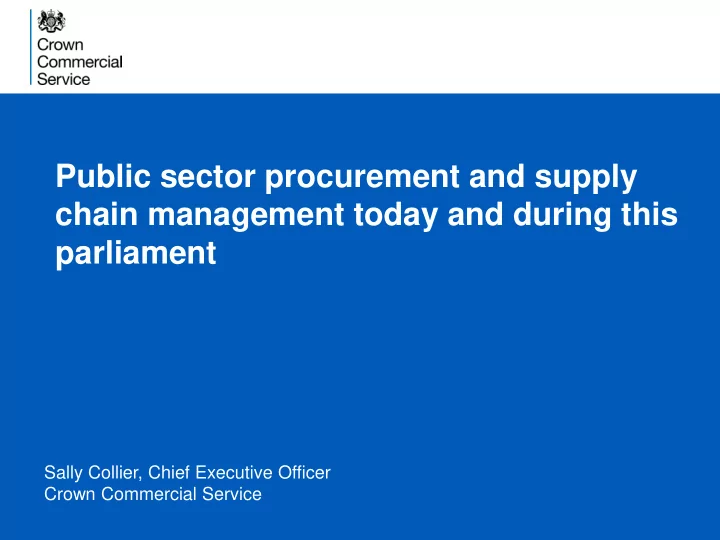

Public sector procurement and supply chain management today and during this parliament Sally Collier, Chief Executive Officer Crown Commercial Service
Why commercial is important Circa £230bn spend p.a. on goods and services across the public sector Better commercial practices saved £5.9bn in 2014/15 against a 2009/10 spending baseline Saving money to support deficit reduction Saving money to protect front line public services Imperatives Supporting economic growth Enabling innovation and new delivery models COUP Event 2
What we do Indirect Buying on behalf of the public sector - £13bn of Direct Buying spend in 2015/16 Policy Delivery on behalf of the public Ministerial priorities and sector - £2bn of fully driving value for money managed spend in 2015/16 Our Purpose: Savings & Service Our challenge: up to £1bn savings (2014/15 baseline) and increasing over this new parliament 3 COUP Event
Some key facts • c£5.9bn savings in 2014/15 against a 2009/10 baseline through Savings better commercial practices; price and demand savings and renegotiating large contracts. • c£15bn of public sector spend through CCS deals in 2014/15. Spend • £2bn under direct management via a managed service. • > 1800 procurements carried out in 2014/15. • 61% of the 2,600 suppliers we work with are small businesses . • 500+ supplier contracts managed on behalf of our customers. Suppliers • New contracting models have led to a 40% reduction in active framework agreements. • 14,500 customers across 1,400 organisations • Business Partners in place - a primary point of contact Customers focused on delivering excellent service to customers (central government and sector leads). 4
Policy priorities • One third of central government spend with small business by Small and medium sized 2019/20; agreeing targets with each department. Prompt payment. businesses • Contributing to the creation of three million apprenticeships Apprenticeships through procurement. Where appropriate, contracts over £10m expected to facilitate a contribution. • Consultation on the draft utilities and concessions directives; Directives both designed to simply process and to make it easier to do business with government. • Additional commercial information such as price and any Transparency incentivisation mechanisms, contract performance metrics etc to be disclosed at contract award. 5
T op 10 reforms in the new Directive • Much simpler process of assessing bidders’ credentials • More freedom for buyers to negotiate with suppliers • Poor performance under previous contracts is grounds for exclusion • Greatly simplified rules on Dynamic Purchasing Systems • Expressly permits the use of electronic catalogues • Reduced red- tape on suppliers’ response times • Clarity that buyers can take into account relevant skills and experience • Clarity that social aspects can now be taken into account • A turnover cap and provisions on breaking up large contracts to help SMEs • Temporary exemption for public service mutuals 7
Deploying a more intelligent approach to delivering savings with our customers Joint approach to Aligned delivery identifying savings plans Partnership with a shared goal Joint savings One collective pot delivery teams of savings 6
Using the full range of commercial levers to deliver savings requires a partnership approach Total cost of ownership (TCO) savings levers • Negotiate and bid competitively Price • Develop fact base on spend and true costs 10-20% Price • Optimise product specifications and service levels Specification 10-20% Specification • Challenge the user – implement strong demand Demand management management policies (only minimum required) Demand 20-30% management • Ensure compliance with preferred suppliers Compliance Compliance • Implement tracking tools and reporting • Optimise payment cycle to optimise reduction in unit 5-15% prices vs. carrying cost Supplier scale • Leverage scale – Harmonise demand between Supplier scale departments • Exploit changes in supplier utilisation, capacity etc. 10-20% 5
Robust supplier management – we expect suppliers …. To be innovative To embrace through proposals To deliver savings competition for how we can for taxpayers improve services To provide To deal effectively To deliver what we opportunities to with CCS as one are asking for as customer – small businesses an intelligent client in the supply chain the Crown To demonstrate To make a To be transparent high levels of reasonable but not through open book corporate excessive profit accounting responsibility 9
Critical Success Factor - specialist capability Corporate People Technology Buildings Solutions • • • • Property Professional Services Travel Network Services • • • • FM Consultancy & Fleet Cloud Services • • • Energy Contingent Labour Communications Technology • Financial Services Products • • Office Solutions Software Licensing • Our focus - accelerating savings through taking a more strategic approach • Listening to customers and suppliers
Improving capability Recruitment of more experienced commercial experts – fewer but more senior people Better management of the talent we have Improving performance through assessment and development Highly skilled specialists with high programmes capability driven by innovation 11
Recommend
More recommend